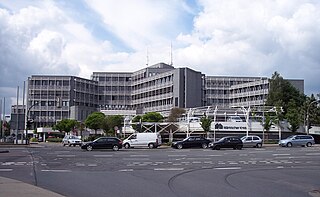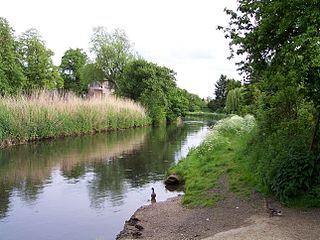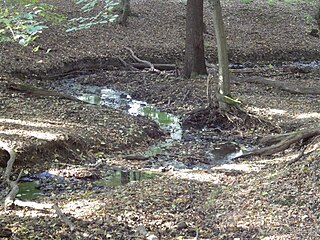
Westphalia is a region of northwestern Germany and one of the three historic parts of the state of North Rhine-Westphalia. It has an area of 20,210 square kilometres (7,800 sq mi) and 7.9 million inhabitants.

North Rhine-Westphalia or North-Rhine/Westphalia, commonly shortened to NRW, is a state (Land) in Western Germany. With more than 18 million inhabitants, it is the most populous state in Germany. Apart from the city-states, it is also the most densely populated state in Germany. Covering an area of 34,084 km2 (13,160 sq mi), it is the fourth-largest German state by size.

The Ruhr is a river in western Germany, a right tributary (east-side) of the Rhine.

The Märkischer Kreis is a district (Kreis) in central North Rhine-Westphalia, Germany. Neighbouring districts are Unna, Soest, Hochsauerland, Olpe, Oberbergischer Kreis, Ennepe-Ruhr, and the city of Hagen.

Iserlohn is a city in the Märkischer Kreis district, in North Rhine-Westphalia, Germany. It is the largest city by population and area within the district and the Sauerland region.

The Sauerland is a rural, hilly area spreading across most of the south-eastern part of North Rhine-Westphalia, in parts heavily forested and, apart from the major valleys, sparsely inhabited.

The Sieg is a river in North Rhine-Westphalia and Rhineland-Palatinate, Germany. It is a right tributary of the Rhine.

The Vechte or Vecht, often called Overijsselse Vecht in the Netherlands to avoid confusion with its Utrecht counterpart, is a river in Germany and the Netherlands. Its total length is 182 km (113 mi), of which 107 km (66 mi) is in Germany.

The Inde is a small river in Belgium and in North Rhine-Westphalia, Germany

The Niers is a river in Germany and the Netherlands, a right tributary of the river Meuse. Its wellspring is near Erkelenz, south of Mönchengladbach, in North Rhine-Westphalia (Germany).

The Emscher is a river, a tributary of the Rhine, that flows through the Ruhr area in North Rhine-Westphalia in western Germany. Its overall length is 83 kilometres (52 mi) with a mean outflow near the mouth into the lower Rhine of 16 m3/s (570 cu ft/s).

The Agger is a river in Germany, a right tributary of the Sieg in North Rhine-Westphalia. It is 69.5 kilometres (43.2 mi) long. Its source is in the Sauerland hills, near Meinerzhagen. It winds through the towns Engelskirchen, Overath and Lohmar. Near Siegburg the Agger flows into the Sieg.

The Dinkel is a river in Germany and the Netherlands, left tributary of the Vecht. Its total length is 89 km (55 mi), of which 47 km (29 mi) in Germany. The Dinkel originates in North Rhine-Westphalia, Germany, between Ahaus and Coesfeld. It flows north to Gronau, crosses the border with the Netherlands (Overijssel), flows through Losser, Denekamp, and recrosses the border to Germany. The Dinkel joins the Vechte in Neuenhaus.

The Wupper-Express is a Regional-Express service in the German state of North Rhine-Westphalia (NRW) running between Aachen and Dortmund via Mönchengladbach, Düsseldorf, Wuppertal and Hagen. It is the third most widely used Regional-Express line in the area administered by the Verkehrsverbund Rhein-Ruhr (VRR) with approximately 24,000 passengers a day. The line is part of the Rhein-Ruhr-Express (RRX) network and is operated by National Express Germany.

Dhünn is a 40 km (25 mi)-long river located in North Rhine-Westphalia, Germany. Its main source is near Wipperfürth in the Bergisches Land area. It runs in a south-westerly direction, and its mouth into the river Wupper is near Leverkusen, appr. 10 km (6.2 mi) north of Cologne.

Wannebach is a stream of North Rhine-Westphalia, Germany. The spring of the Wannebach is in Bürenbruch, a part of Ergste, which is a district of Schwerte. It is a left tributary of the Ruhr.

Iserlohn station is located in central Iserlohn in the German state of North Rhine-Westphalia. It is at the end of two single-track lines, the Ardey Railway (Ardeybahn) from Dortmund and Schwerte and the line from Iserlohn-Letmathe with services from Essen via Hagen. Since 2008, it has operated from a rebuilt station called the Stadtbahnhof.

The Ruhr-Lenne-Express is a Regional-Express service in the German state of North Rhine-Westphalia, running from Essen via Bochum, Witten, Bochum, Hagen and Iserlohn-Letmathe to Iserlohn. It is operated by VIAS Rail hourly.

Lollenbach is a stream of North Rhine-Westphalia, Germany. Its source is between Bürenbruch and Letmathe. The stream has a length of 4.03 km (2.50 mi). Near Reingsen, a part of Schwerte, Lollenbach and Reingser Bach merge to form the Elsebach. Lollenbach is used as a supplier of water for a small fish pond.

Paul Ziemiak is a German politician of the Christian Democratic Union of Germany (CDU) who has been serving as a member of the German Bundestag since the 2017 federal election. In addition to his parliamentary work, he has been serving as the Secretary General of the CDU in North Rhine-Westphalia since 2022, under the leadership of chairman Hendrik Wüst.





















